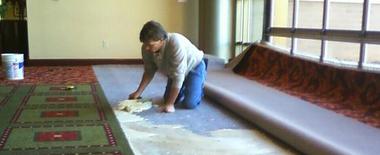Tips from Flooring Pros
Grades of Hardwood
by MIKE POWLEY on 02/19/15
Buying flooring is like anything else from poor quality to
the best (priced accordingly). Realize
that when you are buying hardwood there are different grades of flooring. Hardwoods with different manufacturers have
different grades. When you are getting a
price that sounds to good to be true it just may be. Check with your sales associate to determine
the grade of hardwood you are purchasing.
A lot of times when you buy something that is marked B grade or value
flooring, that’s exactly what it is.
Many of the boards are defective (including imperfections on the face of
the wood). When you are buying expensive
flooring materials and half of the box is damaged it may not be such a good
deal. No one wants a tore up floor right
out of the box. Realizing everyone is on
a budget and price counts, quality will matter to.
Is floor covering a good DIY project?
by MIKE POWLEY on 04/06/14
In the past two weeks I have had to do repairs for two do it
yourself projects. When dealing with
expensive products I feel it is worth the expense to leave the work to the
professionals. Most flooring requires
specialized tools to make the project complete.
The end results will suffer greatly if the correct tools are not
used. Can you afford to replace the
product if the results you get are less than perfect, or are you willing to
live with shabby results for years when you don’t have the proper tools to do
the job? Sometimes a professional can
come in and repair your work, but when the products are damaged the results
will not be as good as it was if you had let the professional do it to begin
with. Sure the big box store will tell
you it’s a good DIY project. They make
more money off you when you come back in and buy more product to replace what
you could not install correctly. I could probably go buy paint and paint my own car or buy shingles and roof my own house, but the end results could be bad.
Transitions in your hardwood flooring
by MIKE POWLEY on 09/01/13When installing hardwood flooring in multiple rooms a lot of the home improvement companies are suggesting placing transitions at door entries. Placing multiple transitions at doorways makes your hardwood flooring look like an afterthought as well as puts more money in the stores pockets. If your installer is incapable of running several rooms without breaking them at doors to make a choppy cheap look maybe you should search for another flooring provider.
Product research is a must
by MIKE POWLEY on 06/20/13Most flooring terms to the average consumer are Greek. Do research on the type of product you are wanting to buy. Educate yourself on carpet weights, padding weights, laminate mills so that you know what you are buying. Another words trusting some salesmen can lead to buying what you think is the best product but receiving the cheapest.
Be an educated consumer
by MIKE POWLEY on 05/12/13Sad but true most people have no idea of the sizes of the rooms to be covered. A quick check yourself prior to having a professional estimate, could save you hundreds or thousands of dollars. Having a general idea of the size and footage of the area to be covered, can also give you reassurance of the trust worthiness of the estimate you receive. Step 1 of measuring your job is determing the furthest points, such as inside door openings, and behind appliances. Start in the biggest area first. Measure wall to wall. Step 2 Then go to the opposite direction and measure wall to wall, keeping in mind behind appliances, and inside door openings. Step 3 For closets or hallways in conjunction with these areas, stop and measure wall to wall both directions. To get the square footage of the room you multiply the length times the width. With multiple areas you add these measurements together for a total square foot. This way complicated areas can be measured easily. Adding five percent to the total square footage, for waste or material defects is the standard for the industry. Avoid being mislead by being knowledgable.


